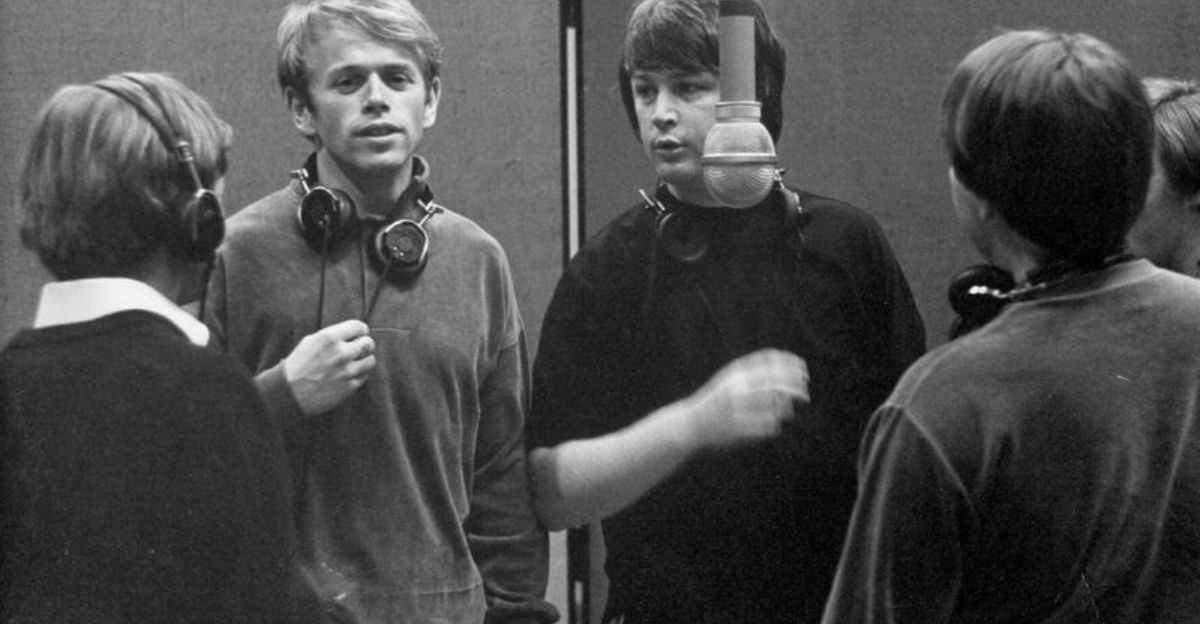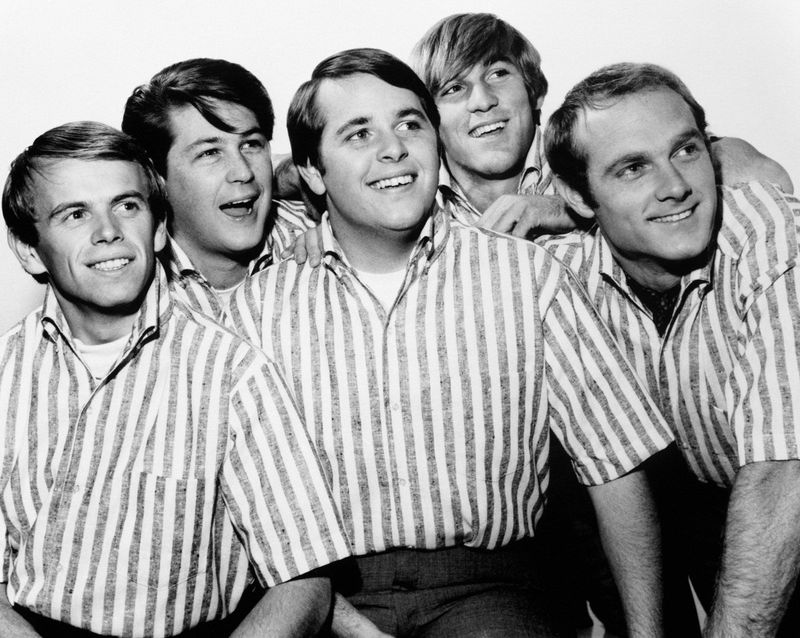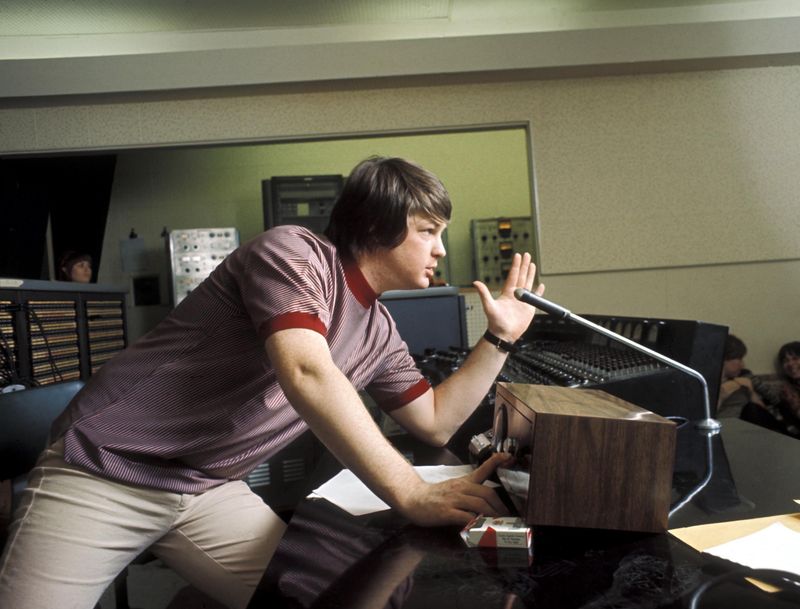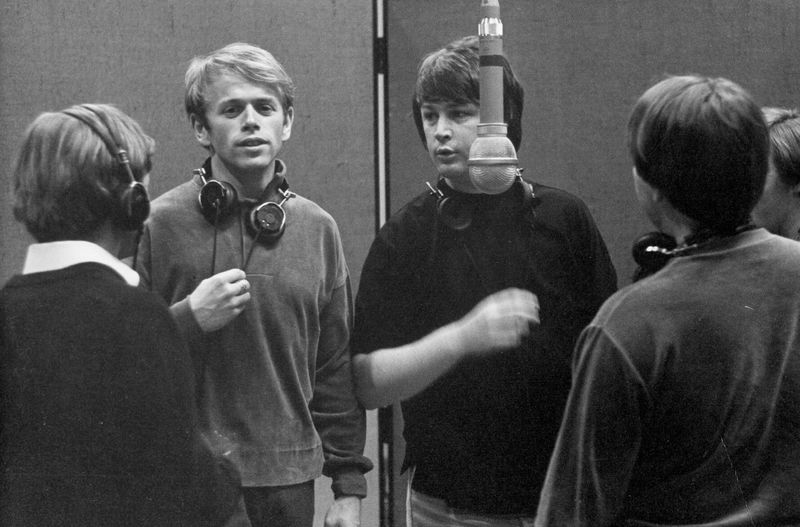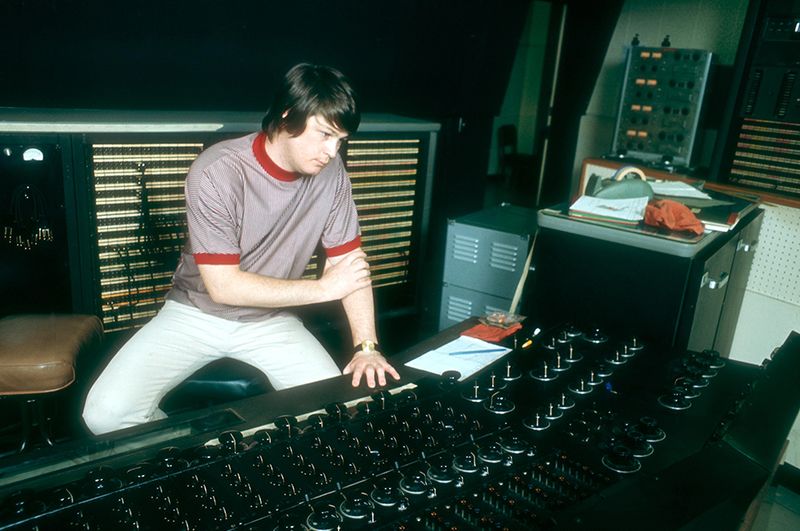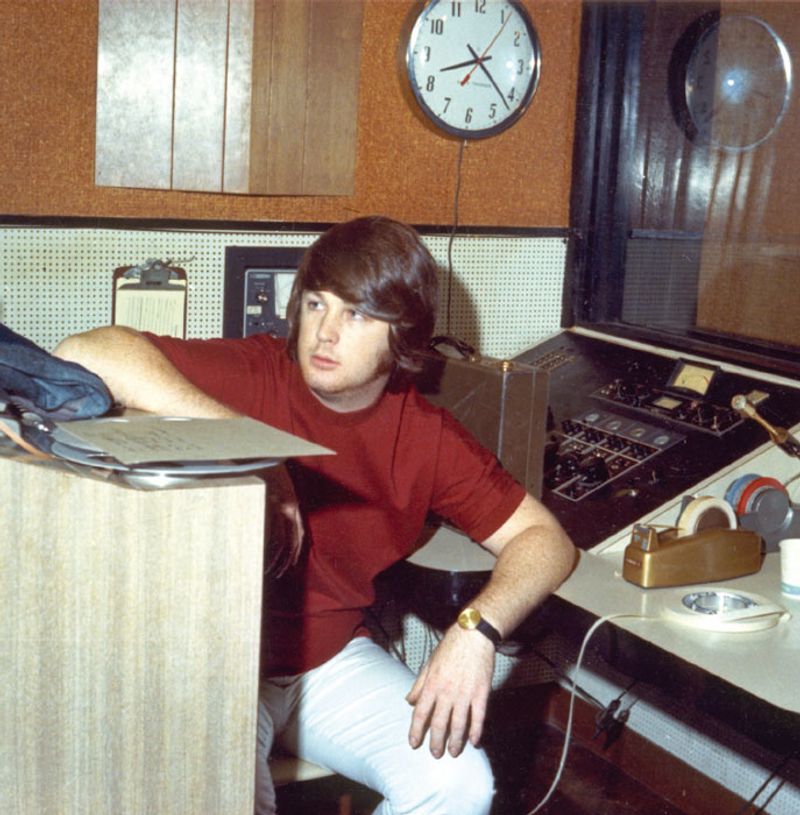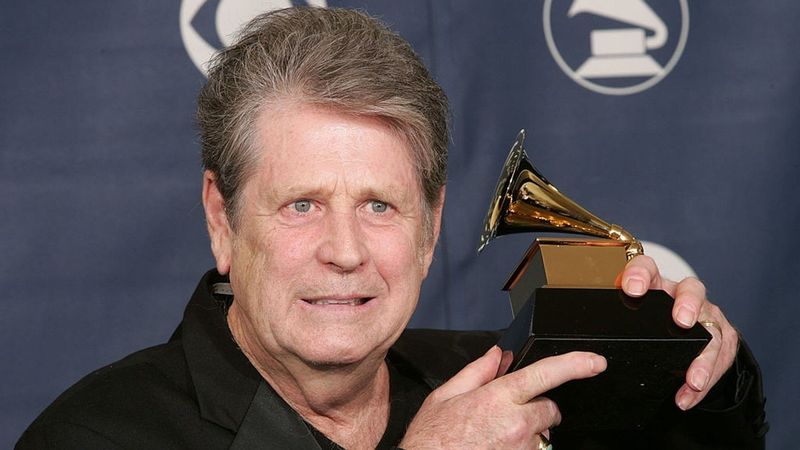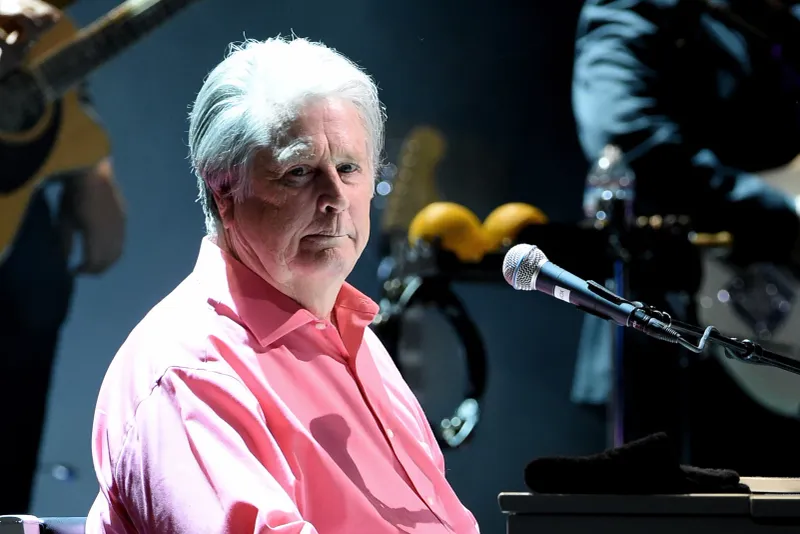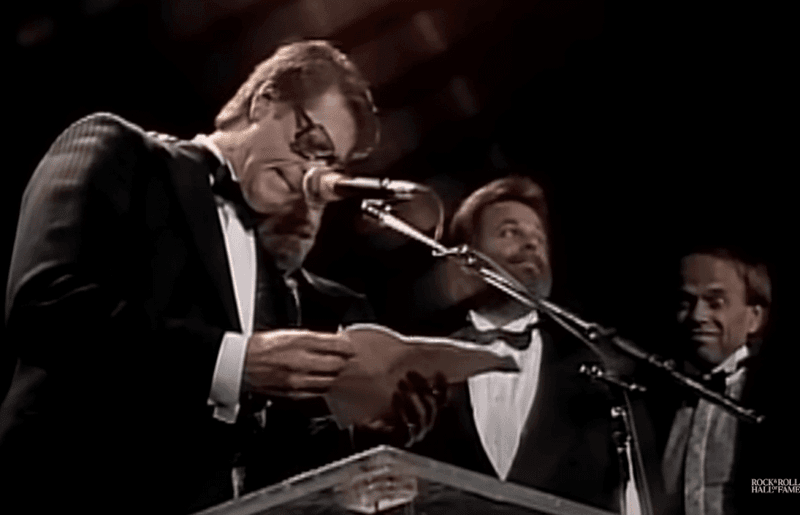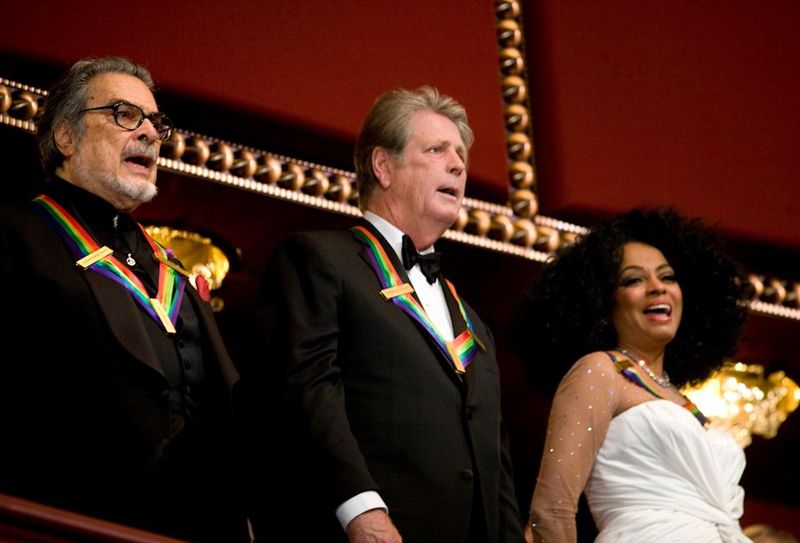Brian Wilson, the creative force behind the Beach Boys, left an indelible mark on music history. Known for his visionary songwriting, studio innovation, and emotional depth, Wilson helped define the sound of the 1960s and beyond. As we honor his legacy, here are 15 of Brian Wilson’s greatest achievements that continue to inspire generations of musicians and fans alike.
1. Co-Founding The Beach Boys (1961)
Five young men with a shared passion for harmonies changed American music forever. Brian Wilson, alongside his brothers Dennis and Carl, cousin Mike Love, and friend Al Jardine, formed a band that would become synonymous with California culture.
What began as casual jam sessions in the Wilson family living room quickly evolved into one of the most influential musical groups in history. Their distinctive vocal blend became the cornerstone of their sound.
The band’s formation marked the beginning of Wilson’s journey as a musical visionary, setting the stage for decades of innovation that would follow.
2. Crafting the California Sound
Sunshine, surfboards, and convertibles cruising down coastal highways – Brian Wilson bottled this essence in musical form. His early compositions captured the carefree spirit of Southern California youth culture, creating a sonic landscape that transported listeners worldwide to the golden shores of the West Coast.
Songs like “Surfin’ U.S.A.” and “California Girls” weren’t just hits; they were cultural artifacts defining an era. Wilson’s genius lay in combining Chuck Berry’s rock influences with complex vocal harmonies inspired by Four Freshmen.
The resulting sound became California’s unofficial soundtrack, influencing countless artists across generations.
3. Creating the Masterpiece “Pet Sounds” (1966)
Heartbreak fueled genius when Brian Wilson channeled personal struggles into what many consider pop music’s greatest achievement. Stepping away from touring, he immersed himself in studio experimentation while the rest of the Beach Boys performed on the road.
The resulting album featured unconventional instruments – bicycle bells, Coca-Cola cans, and barking dogs – alongside traditional orchestration. Songs like “God Only Knows” and “Wouldn’t It Be Nice” revealed vulnerability previously unheard in pop music.
Though initially underappreciated commercially, Pet Sounds gradually earned recognition as one of music’s most influential works, ranking high on virtually every “greatest albums” list.
4. Engineering the Revolutionary “Good Vibrations” (1966)
Six months, four studios, and $50,000 later – an astronomical sum for 1966 – Brian Wilson had created his “pocket symphony.” The revolutionary single incorporated theremin, cello, and harpsichord alongside traditional rock instruments, shifting through multiple musical sections like classical movements.
Wilson recorded fragments separately, assembling them like a musical puzzle. This modular approach to recording was revolutionary, predating modern digital production techniques by decades.
The gamble paid off spectacularly – “Good Vibrations” topped charts worldwide, selling over a million copies and establishing Wilson as pop music’s premier innovator.
5. Pioneering Multi-Track Recording Techniques
Before computers transformed music production, Brian Wilson was creating sonic landscapes using only analog tape and boundless imagination. His revolutionary studio approach turned recording equipment into an instrument itself, pushing the boundaries of what was technically possible in the 1960s.
Wilson would record basic tracks, then repeatedly bounce them to new tapes while adding layers – a technique that allowed him to create densely textured arrangements despite limited technology. Session musicians recall his uncanny ability to hear complete arrangements in his head before recording a single note.
These innovations fundamentally changed how producers approached the studio environment forever.
6. Conceptualizing the Legendary “Smile” Project
Ambition and artistic vision collided in what became music’s most famous unfinished masterpiece. Working alongside lyricist Van Dyke Parks in 1966-67, Wilson envisioned Smile as an American musical journey – a “teenage symphony to God” that would revolutionize album structure.
Mental health struggles and band tensions ultimately derailed the project. Bootlegged fragments circulated among fans for decades, acquiring mythical status in music history.
Nearly four decades later, Wilson finally completed and released Brian Wilson Presents Smile in 2004, vindicating his original vision and providing closure to one of music’s greatest what-ifs.
7. Earning Multiple Grammy Awards
Recognition from music’s highest institution came later in life for the innovative composer. The Recording Academy finally acknowledged Wilson’s genius when he received his first Grammy Award in 2005 for Brian Wilson Presents Smile – nearly four decades after its initial conception.
His acceptance speech, humble and brief, moved the audience to a standing ovation. Additional Grammy recognition followed, including Best Historical Album for The Smile Sessions in 2013.
These accolades represented more than just trophies; they symbolized the industry’s belated recognition of Wilson’s groundbreaking contributions to recording arts and sciences.
8. Overcoming Severe Mental Health Challenges
Few artists have battled such profound inner demons while creating lasting beauty. Diagnosed with schizoaffective disorder and struggling with auditory hallucinations for decades, Wilson’s creative journey was repeatedly interrupted by periods of debilitating mental illness.
The 1970s and 1980s proved especially difficult, with controversial therapist Eugene Landy exerting extreme control over Wilson’s life. His eventual liberation and return to music-making in the late 1990s stands as one of music’s great comeback stories.
Wilson’s openness about his struggles helped destigmatize conversations about mental health in the entertainment industry.
9. Induction into the Rock and Roll Hall of Fame (1988)
Cleveland’s shrine to musical pioneers welcomed the Beach Boys in 1988, acknowledging their revolutionary impact on American popular music. The ceremony highlighted Wilson’s role as the group’s primary songwriter and producer – the architectural genius behind their most groundbreaking work.
Fellow inductee Elton John called Wilson “the greatest American songwriter of all time” during the ceremony. Though personal tensions prevented Wilson from attending alongside other Beach Boys members, his musical contributions formed the centerpiece of the induction.
This recognition solidified his status among rock music’s most influential innovators.
10. Inspiring Musical Legends Across Generations
“Without Pet Sounds, Sgt. Pepper wouldn’t have happened.” Paul McCartney’s famous quote captures just how profoundly Wilson influenced his contemporaries. The Beatles’ producer George Martin described feeling both inspired and intimidated when first hearing Wilson’s masterpiece.
This ripple effect extended far beyond the 1960s. Artists from Radiohead to Fleet Foxes cite Wilson’s harmonic innovations and studio techniques as foundational influences. His approach to vocal arrangements transformed how countless musicians conceptualize harmony.
Few artists can claim to have shaped the creative direction of multiple musical generations across such diverse genres.
11. Launching a Successful Solo Career
Freedom from past constraints unleashed a creative renaissance few thought possible. After decades of struggles, Wilson emerged in the late 1980s with his self-titled solo debut, beginning a prolific period that continues to this day.
Albums like Imagination (1998) and No Pier Pressure (2015) showcased his enduring melodic gifts. The 2004 completion of Smile particularly demonstrated his ability to revisit and perfect his artistic vision decades later.
Critics marveled at how his distinctive musical voice remained intact despite personal challenges, with later works maintaining the emotional depth and harmonic sophistication of his earlier classics.
12. Performing “Pet Sounds” Live in Its Entirety
Standing ovations greeted the musical perfectionist as he conquered seemingly impossible odds. Beginning in 2000, Wilson performed the technically demanding Pet Sounds album live in its entirety – something many thought would never happen given his notorious stage anxiety and the album’s complex arrangements.
Surrounded by musical virtuosos including members of the Wondermints, Wilson recreated the album’s intricate layers with stunning fidelity. Audience members often wept openly during these performances, witnessing the realization of Wilson’s complete artistic vision.
These tours introduced his masterpiece to new generations while providing emotional closure for longtime fans.
13. Receiving Kennedy Center Honors (2007)
America’s highest cultural recognition celebrated the shy composer’s profound impact on national identity. In December 2007, Wilson joined fellow honorees including filmmaker Martin Scorsese and pianist Leon Fleisher at a gala attended by President George W. Bush.
The ceremony featured Art Garfunkel, Lyle Lovett, and Hootie & the Blowfish performing Wilson’s compositions as tribute. Caroline Kennedy described him as someone who “captured the voice of American youth.”
For the once-reclusive musician who had battled stage fright throughout his career, this prestigious acknowledgment represented a particularly poignant milestone in his journey from troubled genius to beloved cultural icon.
14. Earning a Star on the Hollywood Walk of Fame
Cement immortalized the footprint of a man whose sounds had already been etched into cultural memory. Wilson’s Hollywood Boulevard star ceremony in 2000 brought together music industry luminaries celebrating his permanent place in entertainment history.
Fellow Beach Boy Al Jardine spoke movingly about Wilson’s resilience and artistic integrity. The location – outside the historic Capitol Records building where many Beach Boys classics were recorded – held special significance.
Fans gathered to witness this public acknowledgment of Wilson’s journey from Southern California teenager to globally recognized musical innovator whose compositions had become part of America’s cultural fabric.
15. Creating a Legacy of Musical Healing
“Music is God’s voice,” Wilson often said, expressing his belief in its transformative power. Throughout his career, his compositions offered solace to listeners navigating their own emotional struggles.
Songs like “In My Room” spoke directly to the isolated and anxious, while the optimistic harmonies of “Good Vibrations” lifted spirits across generations. His willingness to express vulnerability through music gave others permission to acknowledge their own emotional complexities.
Perhaps Wilson’s greatest achievement transcends charts and awards – the creation of timeless musical spaces where listeners continue to find comfort, connection, and healing.
